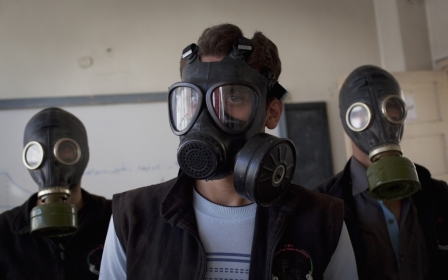Sarin gas used in Syria attack, chemical weapons watchdog told

The banned nerve agent sarin was used in an attack in northern Syria in April that killed and poisoned scores of people, a report for the world's chemical weapons watchdog has said.
The report was given to members of the Organisation for the Prohibition of Chemical Weapons (OPCW) in The Hague, and seen by the Reuters news agency, but was not made public.
'Such a release can only be determined as the use of sarin, as a chemical weapon'
- Fact-finding report to OPCW
The attack on 4 April in Khan Sheikhun, Idlib, was the most deadly in Syria's civil war for more than three years.
The deaths of an estimated 80 people prompted a US missile strike against a Syrian air base which Washington said was used to launch the strike.
After interviewing witnesses and examining samples, a fact-finding mission of the OPCW concluded that "such a release can only be determined as the use of sarin, as a chemical weapon".
The US ambassador to the UN, Nikki Haley, said late on Thursday that the report showed the "undeniable truth" of the attack.
"We look forward to an independent investigation to confirm exactly who was responsible for these brutal attacks so we can find justice for the victims," she said.
A joint UN and OPCW investigation can now look at the incident to determine who is to blame, she said.
The OPCW report is based on "doubtful evidence", Russian news agencies quoted Russia's Foreign Ministry as saying on Friday.
"The contents of the report compiled by a special commission of the OPCW (Organisation for the Prohibition of Chemical Weapons) are largely biased, which makes us think that the activities of this structure serve a political order," TASS news agency quoted Russia's Foreign Ministry as saying.
Such investigations have already found Syrian government forces were responsible for three chlorine gas attacks in 2014 and 2015 and that Islamic State militants used mustard gas.
UK has 'no doubt' Syrian government to blame
The British foreign secretary, Boris Johnson, said there was "absolutely no doubt" the government of Bashar al-Assad was behind the April attack.
"I've got absolutely no doubt that the finger points at the Assad regime," Johnson said, but added that the joint investigation was yet to officially rule.
"We will drive on with the UK campaign to impose sanctions on those responsible... People who drop chemical weapons on innocent people should be held to account."
'People who drop chemical weapons on innocent people should be held to account'
- Boris Johnson, British foreign secretary
Western intelligence agencies had also blamed the Assad government for the April chemical attack. Syrian officials have repeatedly denied using banned toxins in the conflict.
The OPCW fact-finding mission was unable to visit the site itself due to security concerns and would not attempt to get there, the head of the OPCW was said to have decided.
Syria joined the chemicals weapons convention in 2013 under a Russian-US agreement, averting military intervention under the then US president, Barack Obama.
The US said on Wednesday the Syrian government appeared to have heeded a warning this week from Washington not to carry out a chemical weapons attack.
Russia, the Syrian government's main backer in the civil war, warned it would respond proportionately if the US took pre-emptive measures against Syrian forces after Washington said on Monday it appeared the Syrian military was preparing a chemical weapons strike.
Stay informed with MEE's newsletters
Sign up to get the latest alerts, insights and analysis, starting with Turkey Unpacked
Middle East Eye delivers independent and unrivalled coverage and analysis of the Middle East, North Africa and beyond. To learn more about republishing this content and the associated fees, please fill out this form. More about MEE can be found here.




